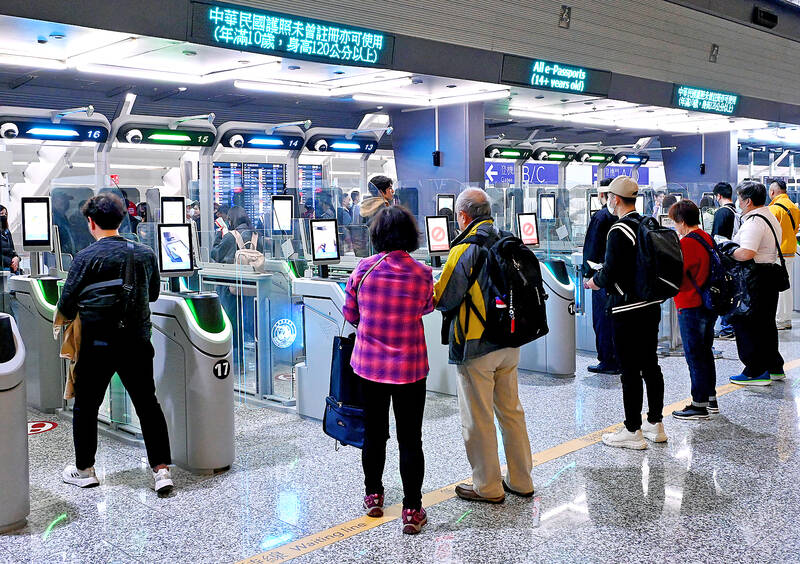The Ministry of Foreign Affairs’ (MOFA) Bureau of Consular Affairs (BOCA) Director-General Calvin Ho (何震寰) has reminded Taiwanese of the services the nation’s consular offices can offer at home and abroad during the peak Lunar New Year travel season.
The nine-day Lunar New Year holiday started yesterday.
One problem some travelers face is realizing only when they get to the airport that their passports do not have the six months of validity required by many countries for entry, he said.

Photo: Chu Pei-hsiung, Taipei Times
“You’d be surprised just how many emergency calls we receive from travelers who forget to check their passport’s expiration date,” he said.
The BOCA offers emergency passport renewal services at Taiwan Taoyuan International Airport, he said, adding that renewing a Taiwanese passport normally costs NT$1,300, but an emergency passport renewal at the airport costs NT$4,900 and requires two to three hours.
Taiwan’s 111 overseas offices around the world also offer emergency services to Taiwanese.
There are around-the-clock emergency hotlines available to all these offices and for MOFA headquarters in Taipei, Ho said.
The most commonly used emergency service for Taiwanese overseas is issuing a new emergency passport after the original was lost or stolen, comprising 40 percent of emergency service requests made to MOFA last year, BOCA data showed.
The second-highest number of requests were for government assistance in dealing with traffic incidents or health emergencies (9.15 percent), the data showed.
What most Taiwanese do not know is that MOFA’s foreign offices can even offer them loans of up to US$800 (or the equivalent in the local currency) to cover expenses abroad before returning home, Ho said.
The service is available only to Taiwan nationals who have an emergency while traveling abroad and urgently need to return home, but cannot immediately get financial help from their families and friends.
Those who get a loan must sign an emergency loan contract, stating that they would return the borrowed amount to MOFA within 60 days after the signing of the contract.
Ho also said there are certain things Taiwan’s overseas offices cannot do in terms of offering assistance to Taiwanese, mostly involving situations where they were suspected of breaking laws or were involved in judicial processes overseas.
BOCA data showed that 5.71 percent of people asking for emergency assistance from MOFA last month contacted the ministry for such reasons.
Based on the ministry’s “Directions for Handling Emergencies Involving ROC [Republic of China] Nationals Traveling Abroad,” diplomatic missions cannot interfere in the judicial or administrative decisions of a foreign government, provide a legal opinion regarding a judicial case, or act as legal agent filing a suit or an appeal on someone’s behalf, Ho said.
What Taiwanese diplomats can do is provide contact information for local organizations or professionals offering legal services, he said.
Ho said it is important for Taiwanese to be aware of what kind of services the nation’s overseas offices can provide when emergencies occur, given the growing number of “so-called influencers who make videos accusing Taiwan’s government of providing little help.”
It has nothing to do with whether Taiwan has diplomatic relations with a certain country, he said.
Taiwanese traveling abroad should log onto a BOCA online registration system, which could help the government quickly locate them in a foreign country in case of an emergency, he added.

An essay competition jointly organized by a local writing society and a publisher affiliated with the Chinese Communist Party (CCP) might have contravened the Act Governing Relations Between the People of the Taiwan Area and the Mainland Area (臺灣地區與大陸地區人民關係條例), the Mainland Affairs Council (MAC) said on Thursday. “In this case, the partner organization is clearly an agency under the CCP’s Fujian Provincial Committee,” MAC Deputy Minister and spokesperson Liang Wen-chieh (梁文傑) said at a news briefing in Taipei. “It also involves bringing Taiwanese students to China with all-expenses-paid arrangements to attend award ceremonies and camps,” Liang said. Those two “characteristics” are typically sufficient

A magnitude 5.9 earthquake that struck about 33km off the coast of Hualien City was the "main shock" in a series of quakes in the area, with aftershocks expected over the next three days, the Central Weather Administration (CWA) said yesterday. Prior to the magnitude 5.9 quake shaking most of Taiwan at 6:53pm yesterday, six other earthquakes stronger than a magnitude of 4, starting with a magnitude 5.5 quake at 6:09pm, occurred in the area. CWA Seismological Center Director Wu Chien-fu (吳健富) confirmed that the quakes were all part of the same series and that the magnitude 5.5 temblor was

The brilliant blue waters, thick foliage and bucolic atmosphere on this seemingly idyllic archipelago deep in the Pacific Ocean belie the key role it now plays in a titanic geopolitical struggle. Palau is again on the front line as China, and the US and its allies prepare their forces in an intensifying contest for control over the Asia-Pacific region. The democratic nation of just 17,000 people hosts US-controlled airstrips and soon-to-be-completed radar installations that the US military describes as “critical” to monitoring vast swathes of water and airspace. It is also a key piece of the second island chain, a string of

The Central Weather Administration has issued a heat alert for southeastern Taiwan, warning of temperatures as high as 36°C today, while alerting some coastal areas of strong winds later in the day. Kaohsiung’s Neimen District (內門) and Pingtung County’s Neipu Township (內埔) are under an orange heat alert, which warns of temperatures as high as 36°C for three consecutive days, the CWA said, citing southwest winds. The heat would also extend to Tainan’s Nansi (楠西) and Yujing (玉井) districts, as well as Pingtung’s Gaoshu (高樹), Yanpu (鹽埔) and Majia (瑪家) townships, it said, forecasting highs of up to 36°C in those areas